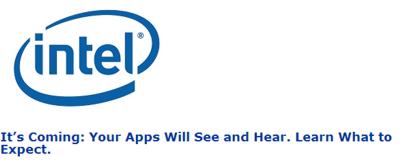| Learn More About Intel RealSense Technology |
| Written by Lucy Black | |||
| Monday, 11 August 2014 | |||
|
Intel recently announced a contest for designing apps for its groundbreaking RealSense platform. A webinar on Wednesday August 13th on how applications are changing as a result of gesture recognition promises to provide technical details never disclosed before.
As this video reveals Intel's 3D sensing technology, called RealSense, opens up new ways to interact with computer devices. Hand and finger tracking, speech and facial recognition add up to what Intel is terming "natural user interfaces", suitable for our 3D world:
For the developer RealSense technology provides interesting opportunities to incorporate gesture recognition into "natural user interfaces" and, with $1 million in prizes on offer in Intel's RealSense App Challenge, it would be good to know more about the technology from experts. Intel is running a series of three eseminars in collaboration with Ziff Davis. The start times for these events are 10:00 Pacific time/ 1:00 pm Eastern time which means if you are in the UK or in Nigeria they start at 6:00 pm and in Kenya at 8:00 pm but you need to register in advance in order to attend the live event. The first of the series It's Coming: Your Apps Will See and Hear, is scheduled for August 13th, with another, Enabling a More Natural Future For Your Application User Interfaces on August 20th. Both these webinars are likely to be of interest to developers participating in Intel's RealSense App Challenge but of course you can register for this new contest without live participation. As outlined previously, this challenge follows on from lasts year's Intel Perceptual Computing Challenge in that it is asking developers to create innovative applications that take advantage of the Intel's perceptual computing SDKs. In view of the fact that some developers have a head start by having submitted a demo to one of the previous contests the RealSense App Challenge has an invitation-only Ambassador track for those who got to the second round last year, However Intel is looking for new entrants to the Pioneer track. For both tracks the contest has two phases. The Ideation Phase in which contestants simply have to submit their ideas and then a Development Phase for which up to 300 from the Ambassador Track and up to 1000 Pioneers will be loaned Intel 3D cameras to convert their ideas into demos. You can read about the contest categories and the prizes in Intel $1 Million RealSense App Challenge and we now know more about the rules. To enter the Pioneer contest you have to be at least 18, and resident in one of the following countries: Argentina, Australia, Belarus, Belgium, Brazil, Canada (not including Quebec), Denmark, Finland, France, Georgia, Germany, India, Indonesia, Israel, Italy, Japan, Kenya, Mexico, Nigeria, Norway, People’s Republic of China, Philippines, Poland, Portugal, Republic of South Africa, Romania, Russia, Singapore, South Korea, Spain, Sweden, Taiwan, Turkey, Ukraine, United Kingdom, United States of America (50 states plus District of Columbia) and Vietnam. This is a more extensive list than for the previous contest, for example it includes Kenya and Nigeria, and Intel is therefore hoping to attract developers who have not got involved with its contest before. You can submit an entry as an individual or on behalf of a group or as an employee on behalf of a company. All entries have to be in English.
The Pioneer track deadline for Round 1, in which you need to come up with an idea that you would turn into a demo using the Developer Kit comprising the Intel RealSense 3D camera and the beta SDK, is October 1, 2014. As the camera and the SDK are not yet available attending the eseminars to learn about the RealSense technology seems like a good first step to making your pitch. Click to go to webinar registration page
More InformationIntel RealSense App Challenge 2014 August 13 Webinar Registration August 20 Webinar Registration Related ArticlesIntel $1 Million RealSense App Challenge Intel Perceptual Computing Challenge Intel's Vision - Perceptual Computing
To be informed about new articles on I Programmer, install the I Programmer Toolbar, subscribe to the RSS feed, follow us on, Twitter, Facebook, Google+ or Linkedin, or sign up for our weekly newsletter.
Comments
or email your comment to: comments@i-programmer.info |
|||
| Last Updated ( Tuesday, 19 August 2014 ) |






